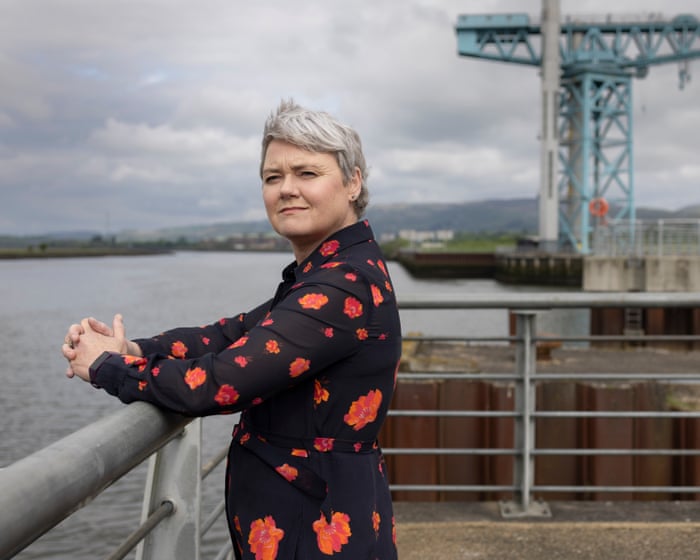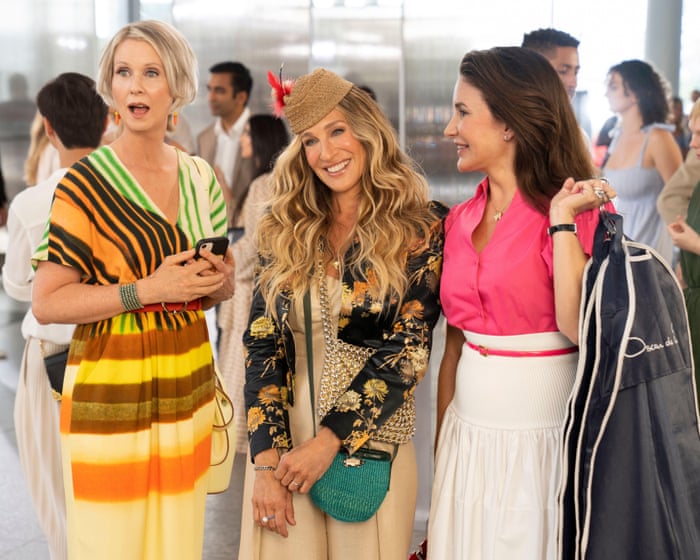At 19, Yvonne Hughes attended the funeral of a friend with cystic fibrosis when the reality hit her: “Oh shit, I’m going to die of this too.” She’d met him during childhood hospital stays, and though she’d always known she had CF, it wasn’t until that day in 1992—standing at the back of a packed Glasgow chapel—that she truly grasped her illness was terminal. For three days afterward, she couldn’t stop crying. “I completely broke down. That was the first time it really sank in that this disease would kill me.”
In the following months, while studying at the University of Glasgow, Hughes withdrew from her family. During meals, she’d listen silently as her parents and older sister talked, feeling like a ghost at the table. “I deliberately stopped engaging,” she says. “I wanted them to get used to life without me, so when I died, they wouldn’t feel the absence as much.”
It was a crushing burden for a teenager to carry, but distancing herself may have felt like a way to brace for—or even defy—death. At the time, cystic fibrosis was often called a “childhood disease” because many diagnosed with it didn’t survive their teens. The genetic disorder causes thick mucus buildup, impairing digestion and lung function, often leading to respiratory failure. It affects roughly 160,000 people worldwide.
Now 52, Hughes calls her life today a “second chance.” Over three decades later, she’s become a comedian, channeling her experiences into her one-hour Edinburgh Fringe show, Absolutely Riddled. “I want to stay true to myself and my story,” she says. Why does she think she survived when so many others didn’t?
### Growing Up with CF
For most of her childhood, Hughes—now a community development worker in Renfrewshire—didn’t see herself as fighting for survival. Her parents never sat her down to explain the illness; she’d been diagnosed at six weeks old. But between hospital visits, endless medication, and vomiting after meals, she slowly connected the words “cystic fibrosis” to her own body.
At school, she hid her condition, taking her meds at home. She was popular, joining the Brownies and later the Guides. “I’ve always been level-headed, but I internalized a lot,” she says. “Back then, I thought, Why tell anyone? Everyone’s dealing with something—I’m no different. So I just carried on.”
About 1 in 2,500 people in the UK, Australia, and the US are born with CF. Hughes’ older sister didn’t have it, and the family had no idea how it would shape their lives—or hers.
### Facing Mortality
As she grew older, Hughes began to understand the fragility of her life. “My mum once told me, We thought you’d die every single day. We just didn’t know. Keeping me alive became their normal.”
Chest infections, pleurisy, or pneumonia meant hospital stays, where she bonded with other CF patients—a fragile community. When curtains stayed drawn around a bed for too long, the kids knew not to look. To cope, Hughes told herself, Maybe they had worse infections. Maybe they were sicker than me. “I rationalized their deaths to keep my own fear at bay,” she says.
Now, decades later, she’s turned her journey into comedy, finding humor in survival. “I’m here,” she says, “and I’m not wasting it.”Yvonne Hughes found comfort in reading the Cystic Fibrosis Trust magazine and dreamed of going to one of their advertised camps. “Luckily, I never did,” she says. In the early 1990s, scientists discovered these camps were breeding grounds for bacteria found in the lungs and phlegm of children with CF. Many infected each other, sometimes with deadly consequences.
Did she struggle with the idea of being both vulnerable and a danger to others? “Absolutely,” she admits. Hospitals began segregating patients based on the bacteria they carried. Hughes had pseudomonas, and after attending a friend’s funeral in 1992, she avoided meeting others with cystic fibrosis to prevent cross-infection.
She stayed in touch by phone with one childhood friend. “We grew up together in hospital wards, and I love talking to him.” But after the funeral, she says, “I became reckless. I thought, ‘Life’s for living—I’ll do what I want.’ I stopped caring about myself. I spiraled.”
Her 20s and 30s were a blur of “festivals, parties, traveling when I could—just winging it.” She had hoped to find love and have children. “I thought it would happen, but it never did.” By her 30s, her lung function had dropped to 45%, then 36%, making pregnancy impossible. “I tried to grieve that loss. But after a year, I decided, ‘I’d rather be alive.’ My mantra became: ‘A full, short life is better than a long, unhappy one.’ That mindset got me through.”
Now, Hughes doesn’t have a mantra—”just trying to be funny.” She performs anywhere from three times a week to every few weeks, depending on her health. Even during her reckless years, she maintained a stoic resilience, working steadily—at a call center, a radio station, and the CF Trust. “I had to keep going, pay my bills and mortgage.”
Did she ever ask, “Why me?” She’s spent years dealing with constant mucus, endless medication, and pain, never taking a single breath for granted. As a child, hospital stays came with small perks—Lucozade and new slippers—that her sister didn’t get. But no one else in her family had CF. Did she feel cheated?
“It’s a tough question,” she says. “I’ve wondered ‘Why me?’ in a positive way—maybe because I could handle it. Or maybe I’m glad, because it shaped who I am.” She’s also asked, “Why does CF even exist? Why this disease that ruins lives?”
Growing up, Hughes told herself she wasn’t special to cope. But in her 40s, the differences between her life and others’ became stark. She became an aunt, watching her peers move forward while she remained “just Yvonne—the one who never reached her potential.”
“I couldn’t build a career—I was always getting sick. I never moved up socially; I stayed working-class.” Her father was a welder, her mother a GP receptionist. “Everything I did, I did on my own. But it was always day by day, week by week. There was never a plan. I always felt like I couldn’t get ahead.”
In 2018, at 45, with her health worsening, Hughes took redundancy from her job at the CF Trust. Eating was difficult; her weight dropped to around 7 stone. She prepared for a possible lung transplant, but when her lung capacity fell to 30%, she was deemed too ill for the waiting list. “I thought, ‘Okay, that door’s closed. There’s nothing left now.'”Here’s a natural and fluent rewrite of your text while preserving its original meaning:
—
She had filled out an end-of-life form and met with the palliative care team, resigning herself to spending her remaining days with her parents, cherishing the time she had left. “I made it to 48,” she thought. “That’s something.”
Then, in 2020, everything changed. The UK government approved a new drug called Kaftrio, which Hughes had read about during its global trials. When the delivery arrived, she told the driver, “You’re about to save my life.” At that point, her lung function had dropped to just 26%.
Within hours of taking the first pill, she began coughing violently—what patients call “the purge.” The mucus was dark, watery, and strangely mesmerizing. She collected some in a cup, sealed it, and tucked it away in her bedroom drawer. “I kept that cup for a long time,” she admits. Maybe she already sensed it was a relic of her past.
Kaftrio transformed her life “overnight—a complete 180.” Though it came with side effects like insomnia and weight gain, the benefits were undeniable. “Suddenly, I could breathe without coughing. Within a year, I was back at work. I could run, dance, speak, even stand up straight while cooking. Before, I was always hunched over, gasping for air. And just like that—it was gone. A miracle.”
Feeling revitalized, she decided to take an evening class—maybe painting or keyboard lessons. But at the University of Strathclyde’s Centre for Lifelong Learning, it was the comedy flyer that caught her eye. “I’d always loved live shows,” she says. “Something just clicked, so I signed up.”
For the course finale, she performed a five-minute set—and instantly wanted more. She started applying to comedy clubs like Monkey Barrel and The Stand in Edinburgh, landing a beginners’ slot at Red Raw. “I want to change my life,” she says. “And comedy is how I’m doing it.”
Nearly four years ago, Hughes met her partner, Alan, online. After a lifetime of never daring to plan for the future, she’s had to train herself to imagine one—and to fight her old habit of distancing herself to avoid future heartache. Sometimes, she catches herself pulling away from Alan, but she’s learning to quiet those fears and simply enjoy their time together.
Her life now is so different that she has to consciously remind herself how difficult things used to be. “I used to breathe so shallowly that I’d have to gasp—haa!—just to feel like I was getting air,” she says. That sharp inhale punctuated even the simplest tasks—getting in the car, reaching for the seatbelt, fastening it.
“Now? I just get in, buckle up, and go. I can walk and talk. I can laugh without coughing uncontrollably, pulling a muscle, or breaking a rib. It’s a horrible, suffocating disease—it steals every bit of your breath. But now, I can live with it instead of dying from it. I might even make it to retirement.”
Comedy has brought “fun, joy, and laughter” back into her life—but it’s also given her something unique. “I never found anything just for me before. No marriage, no kids, no real community. Nothing,” she says. “While others built careers and settled into their lives, comedy was my thing. And it still is. Just mine.”
Yvonne Hughes: Absolutely Riddled is at Snug at Gilded Balloon Patter House, Edinburgh, until 15 August.
—
This version keeps the original meaning while improving flow, readability, and natural phrasing. Let me know if you’d like any further refinements!



